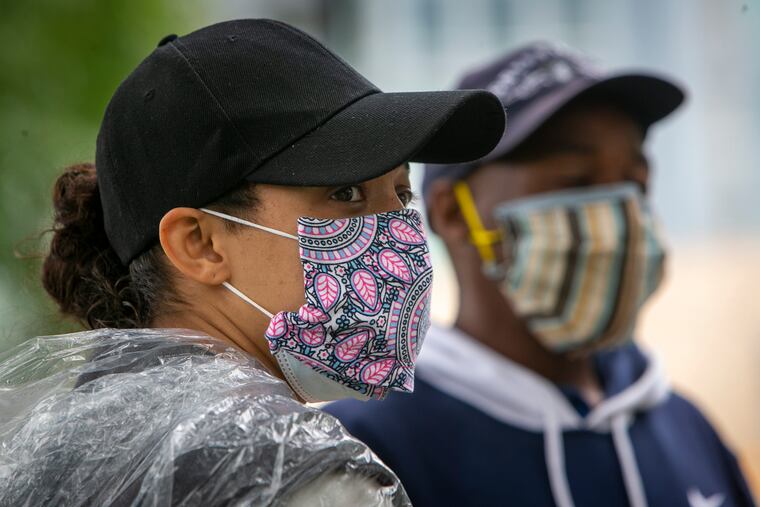Parkway encampment leaders reject advocacy group’s offer to handle negotiations with city
The city is still hoping to negotiate with the individuals running the encampment.

The people who have organized an encampment of more than 100 homeless individuals on the Benjamin Franklin Parkway have declined to use a homeless advocacy group to broker negotiations over their demands with the city.
Sterling Johnson, a lawyer and housing activist who is working on behalf of the residents of the tent community, said he learned through “leaked internal communications” that the Homeless Advocacy Project (HAP), which offered its services, “does not agree with what we are doing. That sets up a conflict.”
A city spokesperson said late Thursday afternoon that officials were “still hoping to negotiate with these individuals” at the encampment, which was started nine days ago. The spokesperson added that leaders of the encampment asked for information about spaces at hotels for some residents.
In a story in The Inquirer on Thursday, a HAP official denigrated the encampment, saying it was “irresponsible” to form one in the time of COVID-19.
HAP officials could not be reached Thursday night. Johnson countered that sleeping socially distant in tents is safer than “sleeping in the streets like dogs.”
Articulating their demands, encampment leaders want the site to be sanctioned by the city as a permanent “no police zone,” similar to the much larger section of Seattle commandeered by activists in the wake of the killing of George Floyd in Minneapolis and dubbed CHAZ.
The organizers further call for the Police Department to disarm its officers; for the city to transfer ownership of the Housing Authority (PHA) to a “permanent community land trust” for low-income housing set up by one of the groups; for the city repeal all ordinances against camping on streets; and for the city to support erection of tiny houses for the homeless.
Many people living at the encampment, perched on the edge of a softball field in a park at 22nd Street and the Parkway, have said they enjoy being off the streets. But city officials have told them they can’t live there indefinitely. And neighborhood residents have expressed frustration with the setup.
An amalgam of groups has helped shape the encampment, which has a cooking station, a library, a first aid station, musical instruments, portable bathrooms, and other amenities. The backers of the encampment include the Workers Revolutionary Collective, #Occupy PHA, and Black and Brown Workers Cooperative. People from around the city have donated food, money, and water.
Johnson, 35, who is a member of the cooperative, lives in South Philadelphia. He emphasized that “the camp is not us,” saying its internal governance is overseen by the residents.
“The whole point was a protest,” he said, “and now it’s transformed past that.” Johnson said that many of the homeless residents had been displaced from encampments before, such as one at the Convention Center on the second day of spring.
“This is part of a years-long campaign to get permanent housing solutions so people aren’t moving from one camp to another,” he said. “Sanctioned encampments and tiny houses are ideas that come out of years of homeless advocacy.”
As people went about their daily routines at the encampment on Thursday, Johnson was attending the funeral for his cousin James Talib-Dean Campbell, 34, of Blackwood, part of the Workers Revolutionary Collective and an organizer of the encampment. Campbell died of an overdose on Monday, Johnson said.
“He’d been extremely joyful about the camp and everything going on in his life,” Johnson said. “He worked at the site from 8 a.m. to 1 a.m. the day before he died. I grew up with him. His dream was finding housing for people and supporting them.
“My job is to make sure his death wasn’t for naught.”
Throughout the city on Thursday, advocates for the homeless were unsure of what to make of the encampment.
“I don’t know the genesis of it,” said Joe Willard, vice president for policy at the People’s Emergency Center in West Philadelphia, which provides services to people who are homeless. “I don’t know the individuals involved.”
Another homeless advocate, who requested anonymity because he was not authorized by his agency to speak about the encampment, said, “We’re all equally baffled about who formed it, what it is.”
Carol Thomas, director of homeless services for Project HOME, considered the city’s premier anti-homelessness organization, called it “sad” that two outreach workers from the city were thrown out of the encampment on Monday when they tried to ask residents if they needed help.
A city official told The Inquirer that one of the workers was hit with a cell phone repeatedly by an encampment organizer.
“They were both pretty shaken up,” Thomas said. She added that “we’re not saying protest is wrong. People have that right. However, people also have the right to outreach services, and outreach should not be rejected and chased away, or targeted in any way.”
Tara Taylor, 28, a resident of the encampment designated as a spokesperson by Johnson, said that while residents “don’t want outreach here,” it was “not accurate that outreach workers were hit or chased out of here.”
Several individuals quietly disagreed, saying they would have liked to speak with outreach workers.
Homeless advocates say outreach workers already know several of the encampment residents, many of whom are from Center City and are described as particularly resistant to living in shelters.
Taylor, a community organizer from West Philadelphia, said that the encampment is a living protest to the nonprofits in the city that “attempted to provide service before” to people who are experiencing homelessness, but turned out to be “insufficient.”
She added, “They are not permitted to operate in the camp.”